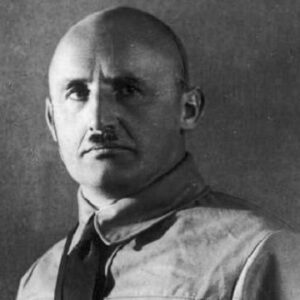Julius Streicher was a German politician and member of the NSDAP who was notorious for inciting the German people to hate Jews. He wrote a series of anti-Semitic publications aiming at brainwashing youngsters from a young age against the alleged dangers of Jews. He was given the appropriate moniker of ‘Jew-baiter Number One’ in his country due to his active engagement in Nazi propaganda to expel Jews from Germany and his unwavering support for Adolf Hitler and his goals. Prior to the outbreak of World War II, Streicher was accused of being involved in a number of Jewish murders. Despite the fact that he was Hitler’s right-hand man, some of the officials who served with him thought he was unstable and unpredictable. He was convicted of crimes against humanity and executed after the war.
Childhood and Adolescence
Julius Streicher was born in the Bavarian town of Fleinhausen on February 12, 1885, to Friedrich Streicher and Anna nee Weiss. His father was a teacher in a primary school.
At the start of his career, he followed in his father’s footsteps and worked as an elementary school teacher. He enlisted in the German army in 1914. By 1918, he had been raised to the rank of lieutenant and had received the Iron Cross.
Career of Julius Streicher
After Germany’s loss in World War I, Streicher became involved in radical politics, joining the ‘Schutz-und-Trutz Bund,’ a party dedicated to opposing the Bavarian republic. After becoming engaged with this group, he began to show anti-Semitic tendencies, which would eventually turn into a nasty propaganda campaign.
He then co-founded the ‘Deutschsozialistische Partei,’ a German Socialist Party. However, its claim to socialist ideas was only a ruse; what they were really concerned with was the promotion of anti-Catholicism and anti-Semitism.
Streicher’s anti-Semitic journal, ‘Der Stürmer,’ had perhaps the most important role in propagating anti-Semitism against Jews. This periodical instilled in the minds of Nazi Germans thoughts of anti-Semitism toward Jews.
His attempts to negatively affect the German populace resulted in his dismissal from the classroom. He spent the following many years as the leader of a local Nazi party that functioned outside of the law.
Between 1924 to 1932, Streicher served as a member of the Bavarian Parliament. As soon as Hitler was released from prison, he appointed him as the district head, or ‘Gauleiter,’ of Middle Franconia.
As a member of the National Socialist Party, one of his first responsibilities was to lead the central committee for boycotting agitation and repulsing Jewish atrocities. Streicher orchestrated a one-day boycott of Jewish companies on April 1, 1933, in this capacity.
After the triumph of ‘Der Stürmer,’ he published ‘Giftpilz,’ or ‘The Poisonous Mushroom,’ another anti-Semitic work. He went on to explain the Jewish religion’s hidden dangers in the book.
He was charged with publicly insulting Reichmarschall Hermann Goering. As a result, Streicher’s leadership position in the party was permanently removed by the German Supreme Court.
In May 1945, US forces apprehended Streicher and took him before the International Military Tribunal for trial. On the 16th of October 1946, he was tried and killed in Nuremberg for the various crimes against humanity he had committed.
Streicher’s efforts were so vital to Hitler’s political career that he was given the title of ‘Gauleiter’ of the province of Middle Franconia, which meant ‘district leader.’
Personal History and Legacy
In 1913, Streicher married Kunigunde Roth, the daughter of a baker. Their marriage resulted in the birth of two sons, Lothar and Elmar.
Streicher married Adele Tappe, his former secretary, in May 1945.
In May 1945, he was apprehended by US forces. The International Military Tribune at Nuremberg executed Streicher on October 16, 1946.
Estimated Net Worth
The estimated net worth of Julius Streicher is unknown.
Trivia
He claimed that hearing Hitler speak in Munich in 1921 changed his life. By joining forces with his new-found mentor and his Nazi Party, he was able to practically double the party’s power by bringing in his pool of sympathizers.
He had marched alongside Hitler in the Beer Hall Putsch and had also survived police bullets in Munich. As a result of this conduct, Hitler admitted that he absolutely trusted him and that he felt he would become one of his few confidants.


